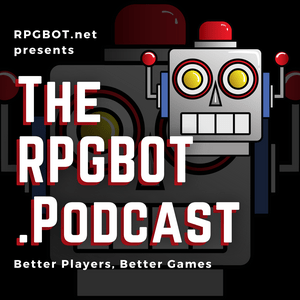WARHAMMER 40K IMPERIUM MALEDICTUM - An Introduction: Mutants, Mayhem, and Middle Management
The RPGBOT.Podcast team dives headfirst into the chaos, corruption, and cosmic bureaucracy of Warhammer: 40,000 - Imperium Maledictum—where your worst day in HR is just the beginning. Links Imperium Maledictum Core Rulebook (affiliate link) Starter Set (affiliate link) Imperium Maledictum Digitals on DriveThru (affiliate link) In this episode, the RPGBOT hosts take a deep dive into the dark, dystopian world of Warhammer 40,000 through the lens of its RPG adaptation, Imperium Maledictum. The conversation blends humorous banter with insightful analysis, offering listeners both entertainment and education. The hosts start with an overview of the setting’s lore, including the Emperor's role, the brutal nature of the Imperium, and the ever-present threat of Chaos. They explore the concept of Grimdark, the loss of advanced technology, and the unique role of the Eldar as twisted space elves. The discussion covers how these elements shape the game's tone and influence character creation. Further into the episode, the group breaks down the game's mechanics, including its D100 system, critical injuries, corruption and mutation, psychic powers, and the use of factions and patrons. They also touch on gameplay themes, such as horror, political intrigue, and the struggle of ordinary individuals caught in a merciless galaxy. Throughout the episode, the hosts celebrate the flexibility of Imperium Maledictum, brainstorming campaign ideas and character concepts, while emphasizing that storytelling and narrative immersion are central to the experience. Key Segments: 1. Warhammer 40K Lore Overview The Emperor’s role as a guiding force in interstellar navigation. Humanity’s decline in the face of ancient alien threats and rogue AI. The dark, magical nature of the Warp and the emergence of Chaos Gods. Eldar as corrupted, tragic analogs of fantasy elves. The Imperium as a bureaucratic and religious nightmare. 2. The Grimdark Tone “In the grim darkness of the far future, there is only war” – and it shows. Every victory feels like a loss; choices often have no good outcomes. The concept of technological regression and lost knowledge. Humanity’s struggle framed as a desperate survival in an uncaring universe. 3. Game Mechanics Uses a D100 system with degrees of success for outcomes. Initiative is fixed, reducing bookkeeping during combat. Critical injuries, healing, and long-term character impact. Mutation and corruption as central elements—both physical and narrative. Psykers (psychic users) are powerful but dangerous to use. 4. Setting of Imperium Maledictum Focuses on the Mecarion Sector, conquered by Solar Mecarion. Earth (Terra) is portrayed as a decaying industrial monolith. Patrons (influential NPCs) shape missions and character growth. Factions within the Imperium provide unique gameplay hooks. 5. Themes and Campaign Ideas Encourages stories beyond combat—mystery, horror, political drama. Game supports both serious and comedic storytelling styles. Emphasis on ordinary characters in extraordinary situations. Ideas floated include office politics in a hive city and noir-style investigation Key Takeaways: Imperium Maledictum is a spiritual successor to Dark Heresy, steeped in lore and focused on immersive storytelling. The Emperor is vital not just spiritually, but also functionally, enabling warp travel. Warhammer 40K's aesthetics are intentionally excessive and impractical. The setting has shaped, and been shaped by, decades of science fiction and fantasy. Characters are vulnerable—critical injuries, mutation, and corruption are ever-present. Psykers function like wizards, with significant risks attached to their powers. Patrons and factions provide narrative depth and mission structure. Combat is strategic and punishing, but narrative drives the gameplay. The game encourages creativity in character creation, campaign themes, and tone. Scenarios can range from horror to satire, showcasing the game's flexibility. If you enjoy the show, please rate and review us on Apple Podcasts, Spotify, or your favorite podcast app. It’s a quick, free way to support the podcast, and helps us reach new listeners. If you love the show, consider joining us on Patreon, where backers at the $5 and above tiers get ad free access to RPGBOT.net and the RPGBOT.Podcast, can chat directly to members of the RPGBOT team and community on the RPGBOT.Discord, and can join us for live-streamed recordings. Support us on Amazon.com when you purchase products recommended in the show at the following link: https://amzn.to/3NwElxQ How to Find Us: In-depth articles, guides, handbooks, reviews, news on Tabletop Role Playing at RPGBOT.net Tyler Kamstra Twitter: @RPGBOTDOTNET Facebook: rpgbotbotdotnet Bluesky:rpgbot.bsky.social Ash Ely Professional Game Master on StartPlaying.Games Twitter: @GravenAshes YouTube@ashravenmedia Randall James @JackAmateur Amateurjack.com Producer Dan @Lzr_illuminati
